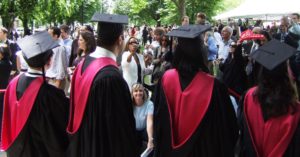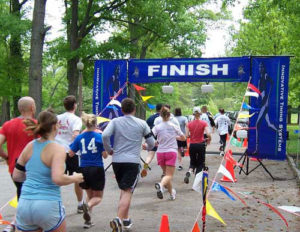March 20th, 2017
Resident Wellness in Graduate Medical Education
Kashif Shaikh, MD

Kashif Shaikh, MD, is the 2016-17 Chief Resident in Internal Medicine at the University of Central Florida College of Medicine.
Happy Endings:
Living in Orlando, one cannot escape Disney. Disney movies are a delight, because one subconsciously anticipates that the happy ending is going to make up for the rest of the characters’ struggles. It works for me!
Be it Simba, Cinderella, Snow White, Belle, or Elsa, every Disney fairy tale gives us the desired ending of a happy and prosperous life. These characters go through many adversities, and new pages turn in their stories, but there is always a ray of light at the end of the tunnel.
So, without a predestined Disney ending, how do people in healthcare professions cope with the daily stress? For me, music and movies allow me to recover and recuperate. For others, the escape might be sports, arts, travel, music, family or social time, or something else that provides social support. Life is full of challenges and surprises, but it would be absolutely boring without any challenges, right?
The beginning of the story:
The first and the last day of medical school are unforgettable experiences for most of us. We are anxious, nervous, and terrified on day one, because we don’t know what the future will bring. But that last day makes up for it — we look back and smile — we have made it and can embark on our next adventure (residency).
As they say, success is not a destination. It is the direction in which one is traveling. First, let me describe my own situation: During the first month of my internship, I went through a big learning curve, like most of us do. (Just for context, I was in the last batch of interns who were allowed to work 24 hours shifts. When I became a second-year resident, the ACGME decreased the maximum work hours to 16 for the interns.) Long hours are stressful, even under the best of circumstances.
I have supportive family and friends, and I found a little group where I could share my problems and support others — bottling up frustration does not help! My colleagues gave me perspective on handling stressful situations or scenarios. As I advanced, my friends were one of the reasons that I looked forward to going to work every day. My biggest support groups during residency were my patients (who made me feel tremendously happy and fulfilled, because I was taking care of them), my colleagues, and my wonderful medical students. Healthcare is, no doubt, one of the most stressful professions. It requires utmost dedication. As residents, we make sacrifices in our social lives, like missing holidays with our families and our best friends’ birthdays and weddings. (Not to mention the obligation to work on presentations and research projects and to study for ITE exams and boards.) Residents must apply for fellowships and jobs after graduation. All of this happens at such a fast pace that we barely keep our heads above water. So how does one find a balance when one works so much and socializes so little?Achieving Resident wellness:
Most medical graduate programs struggle with promoting resident wellness. In a 2016 systematic review by KS Raj, resident well-being was lower than that in the general population (J Grad Med Educ 2016; 8:674). Notably, PGY1s reported less satisfaction with their lifestyle than did PGY2s and PGY3s. However, the reviewer also noted that resident autonomy, competence, and social relatedness was associated with greater resident well-being:
- A sense of control and autonomy
- Pursuit and achievement of goals
- Opportunities for learning
- Confidence
- Increasing mastery of techniques and interactions
- Positive feedback
- Positive colleague relationships
Sleep is another important factor in resident wellness. Residents who were not sleep-deprived reported better well-being. Residents with more personal-time availability for activities such as exercise, socialization, and errands were more likely to report positive residency experiences and positive emotions. Being in a relationship was associated with overall improved well-being.
Residents identified their well-being as affecting relatedness (specifically, the quality of discussions with patients and interactions with colleagues), competence (performance and decision-making), and autonomy (motivation with both daily work and career).
In a 2017 JAMA analysis, Shanafelt et al. found greater mental well-being to be associated with greater empathy in internal medicine residents. Also, ITE scores and academic success has no correlation with well-being (JAMA 2017; 317:901). Interventions such as faculty meetings at scheduled intervals to discuss progress and goals did not improve resident well-being or decrease burnout rates.
Should residency programs implement wellness programs?
According to Raj, residents who are most likely to participate in wellness programs are those younger than 32, females, and whites. Men more often question the utility of participating, whereas nonwhite residents are more likely to be concerned about confidentiality. Other factors associated with not utilizing a provided wellness program are a feeling of helplessness and perceived stigma.
As I was surviving my intern year, I promised myself that I would help my interns and medical students. I told myself that I would support them, that I would create a nurturing environment for learners and treat them not only as my colleagues but also as my comrades and friends. I would encourage them to share their problems; I would give counsel and guidance and support. Now, I’m a Chief Resident and I’m trying to keep my promises I made to myself. I try to make sure my interns and students don’t have to go through the difficult times alone.

By Clever Cupcakes from Montreal, Canada (Doctor Themed Cupcakes) [CC BY 2.0], via Wikimedia Commons
My recommendations to Chief Residents and residency programs:
1. Provide and ensure resident autonomy, competence, strong social relatedness, adequate sleep hours, and time away from work.
2. Encourage and promote perseverance, which is predictive of well-being, and greater well-being is associated with increased resident empathy.
3. We don’t yet know which specific interventions enhance residents’ well-being. Therefore, wellness committees from different programs should create a forum wherein they can share strategies that have been effective.
4. Provide third-party counselors to avoid stigma from seeking counsel.
5. Form support groups, where people can share their own experiences and provide support to others.
6. Organize more social events and group activities for team building.
7. And, most importantly for all of us: Look after your colleagues and friends, including medical students.
Please feel free to share any intervention that has improved well-being of residents in your program or anything else that you think might help.“Health is a state of body. Wellness is a state of being.” — J. Stanford








Well said. Nice suggestions – now you will have to walk the walk. . . .
One small comment – although SURVIVAL is the name of the game – I think it is also reasonable to suggest that improvement, enhancement, challenge and mastery are also names of this game – and not all will raise to their set challenge point – and that’s OK as well. In “Top Gun” the selection process is 100 X that of medicine, the training 1000 times more rigorous and lethal, and candidates do their best, and understand that not everyone can be a first place winner – but all can do their best, honourably! Sense of community and support team seems a good idea – augmented by the leadership challenge (that’s you – chief!).
(P.S.I was a chief once – thoughtful, graded self disclosure can also be helpful if appropriate.)
Thank you for sharing your thoughts and recommendations!
Item 1 on that list matters more than everything else combined. Treat residents with respect, give them appropriate autonomy and actually let them sleep instead of working them to the bone and then sending them to wellness seminars about the importance of all the sleep they are not getting.
Hello Dr Kashif
I completed my MBBS from India and now plan to go for my post graduation in Internal medicine in US. Sir I would like to know that whether the medical education gained in US would be helpful back in our country because I came to know that the health care system and major diseases which the residents come across there are very different from India. Your kind reply will be really appreciated.
Regards